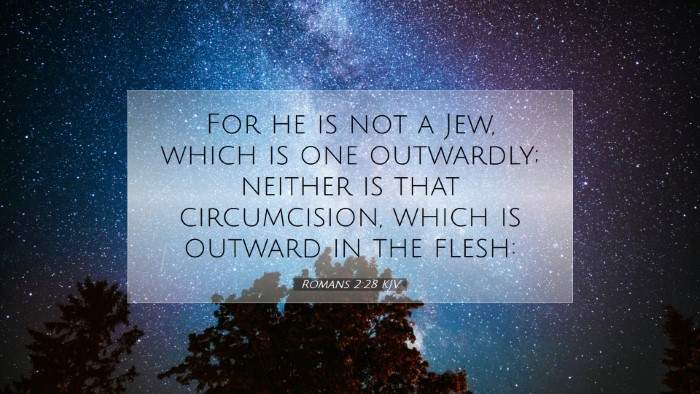Commentary on Romans 2:28
The verse Romans 2:28 states: "For he is not a Jew, which is one outwardly; neither is that circumcision, which is outward in the flesh."
This verse is part of the Apostle Paul's larger argument concerning the true nature of God's people and the significance of true faith versus mere external adherence to the Law. In this commentary, we will explore various insights from public domain commentaries by Matthew Henry, Albert Barnes, and Adam Clarke.
Contextual Analysis
The context of Romans 2 reveals Paul's discourse on judgment and the nature of true righteousness.
Here, Paul addresses both Jew and Gentile, challenging the preconceived notions of identity, particularly among the Jewish people.
Matthew Henry emphasizes that Paul is dismantling the idea that being a Jew or performing the act of circumcision guarantees acceptance before God.
He argues that true circumcision is a matter of the heart, not merely an external sign.
The metaphysical distinction Paul makes serves to highlight the inadequacy of relying on ethnic identity and ritual alone for salvation.
True Identity in Christ
Albert Barnes reflects on the implications of this verse for both Jews and Gentiles, suggesting that true identity comes from inward spiritual transformation.
He writes that the emphasis on the heart's condition transcends ethnic and ritualistic boundaries, pointing to the necessity of regeneration and faith in Christ.
This redefinition of identity invites theological reflection on what it means to belong to God.
According to Barnes, the dynamics of the New Covenant call for a profound inward change rather than mere outward conformity.
The Significance of Circumcision
Adam Clarke provides insights on the traditional Jewish understanding of circumcision.
He notes that it was viewed not only as a ritual but as a covenantal sign linking the people of Israel to God. However, Clarke poignantly points out that if the heart is not circumcised, the outward sign is meaningless.
Clarke argues that Paul is arguing against complacency; being part of a covenant community is not a guarantee of salvation if it is not accompanied by genuine faith and obedience.
Theological Implications
Romans 2:28 pushes believers to wrestle with critical theological concepts.
- Faith vs. Works: The danger of equating religious heritage or traditions with faith is a prevalent theme in Paul's writings.
- Inward vs. Outward: The dichotomy of inward spirituality compared to outward ritualism is crucial for understanding true piety.
- Inclusivity of the Gospel: This verse requires the readers to acknowledge that the grace of God extends beyond ethnic lines.
Practical Applications
For pastors and Christian leaders today, Romans 2:28 serves as a reminder that spiritual authority and identity should not rely solely on cultural or traditional practices.
- Preaching the Heart of the Gospel: Messages should focus on personal faith rather than superficial adherence to religious practices.
- Inclusivity in Ministry: Church communities must strive to embrace individuals from diverse backgrounds, fostering an environment where inward transformation is prioritized.
- Encouragement for Self-Examination: Believers are called to examine their faith and ensure they are rooted in a personal relationship with Christ.
Conclusion
In conclusion, Romans 2:28 encapsulates the transformative message of the Gospel.
It reiterates that simply being part of a covenant community, or possessing religious rites, is insufficient for genuine faith.
True belonging to God's family is a matter of the heart and requires a response to God's grace through faith in Jesus Christ.
As we reflect on this verse, it invites a deeper examination of our own lives and communities, urging us to seek authenticity in our walk with God.


